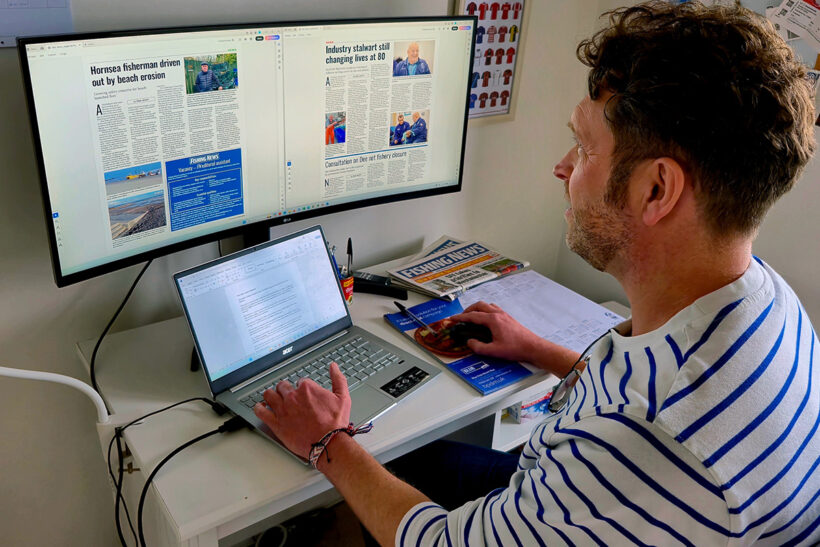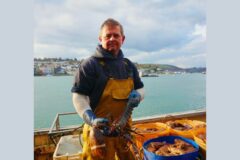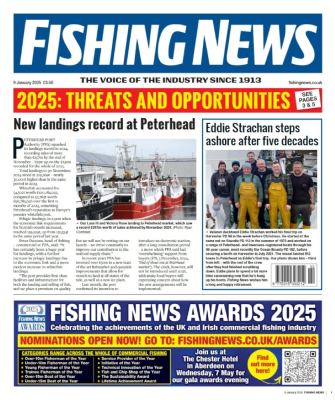Growing up in Poole, Dorset, it’s almost impossible to not be influenced by the sea. From crabbing off the quayside to exploring the treasures unveiled by low tide, I’m very much a product of my environment.
That sense of place stayed with me into adulthood. Much of my twenties was spent travelling – and whenever I ended up by the sea, wherever that might be in the world, I always felt at home. When finally, aged 27, I made the decision to return to education to study journalism, I chose Cornwall – knowing that I’d never be far from the sea.
It was in Cornwall that my love for seafood really started to develop. Whilst studying, I worked part-time at a well-known supermarket. Having befriended the store’s fishmonger, I was perhaps the best-fed student in the country, often going home with unsold and heavily discounted lobster, dressed crab, oysters, fillets of bass…
After graduating in 2011, I spent the following decade in the marketing sector – but all the while my passion for seafood continued to grow. I developed a particular interest in sourcing and cooking less popular species – gurnard, grey mullet, velvet swimming crabs…
That passion led to the creation of my own seafood blog (fishfaceseafoodblog.co.uk), with the initial aim of educating myself about the availability and seasonality of species found in UK waters. In January 2022, that education took a further step when I joined FN as editorial assistant.

Paul in Poole Harbour at low tide. In any spare time, he works on his seafood blog at: fishfaceseafoodblog.co.uk. “The blog is challenging at times. It’s entirely self-funded and doesn’t generate an income, but it’s something that I enjoy doing – and something I believe needs doing.”
My role is entirely home-based, and I’m normally at my desk for 8am – with the first job of the day being to go through any emails that have come in overnight. One of my main tasks at the start of each week is to identify news stories for the next issue. I have a comprehensive spreadsheet of websites for a host of industry-related businesses, charities and organisations from which news stories might be sourced. I’ve also built up a good network of contacts who will send me potential stories.
As the week progresses, and with the edition beginning to take shape, I’ll start to focus on writing – which could include anything from news stories and reviews to longer feature-style pieces. This often involves contacting people for comment and sourcing pictures – neither of which is always easy! I like to have some knowledge of the subject I’ve been tasked to write about, so I’ll spend some time researching people, places and policy, to ensure I ask informed questions.
It’s then a case of transcribing any interviews, and writing my draft copy. Ideally, I like to revisit the copy a couple of times – though that isn’t always possible owing to the tight deadlines on a weekly publication. The copy is then tweaked, fact-checked, proof-read and submitted.
I’m also responsible for sub-editing some of the copy sent in by FN’s team of contributors. This doesn’t normally involve any drastic edits, and is more to ensure that the text is consistent with the paper’s style guide – for example, the way in which dates, times and units of measurement are presented.
Thursday is when the pace goes up a notch, with a strict 4pm deadline for all pages to be signed off ready for the printer. Any last-minute stories need to be written – with an increased urgency in sourcing images or additional comment in time.
Another of the important tasks on a Thursday is to write up the week’s market prices, sub-edit the reports that come in from the Newlyn, Peterhead and Shetland markets. At around 11am, John Rogers, chief auctioneer at Brixham Trawler Agents, or long-serving auctioneer Todd Crombie will call with the week’s prices from Brixham fishmarket. John and Todd have been brilliant with me from the beginning, and have really helped develop my understanding of the industry – for which I’m very grateful.

Working on the week’s market prices. “John Rogers or Todd Crombie of Brixham Trawler Agents calls me every Thursday with the prices, and their call is one of the highlights of my week. In addition to market activity, I might also get the odd story or two from their time at sea!”
With the prices written up, the remainder of ‘press day’ is spent helping editor Andy Read and managing editor Gaby Bartai with any urgent requests – anything from formatting images or fact-checking to sourcing additional information.
I’m also tasked with running ‘pre-flight’ checks on the digital PDFs of each page as the final versions come in from the designer. These final checks look at the page as a whole, ensuring, for instance, that columns of text are aligned and that no errors have slipped through in the headlines and captions.
It’s a process that requires concentration and focus – and if a page doesn’t come in from the designer until 3.50pm, a calm head is also needed!
In addition to all of the above, I’ve also had the pleasure of writing the Day in the Life series. The fishing industry is one beset by an ever-increasing number of challenges, but as I’ve discovered through interviewing people from across the sector, it is also brimming with proud, hardworking and passionate people.
This, sadly, is my final week in the role – but though I’m off to head for new grounds, I will forever feel immense pride at having had the opportunity to play a small part in this great industry.
Applications to become the next Fishing News editorial assistant are open until Sunday, 26 January. Click here to find out more.
This story was taken from the latest issue of Fishing News. For more up-to-date and in-depth reports on the UK and Irish commercial fishing sector, subscribe to Fishing News here or buy the latest single issue for just £3.50 here.
Sign up to Fishing News’ FREE e-newsletter here.





